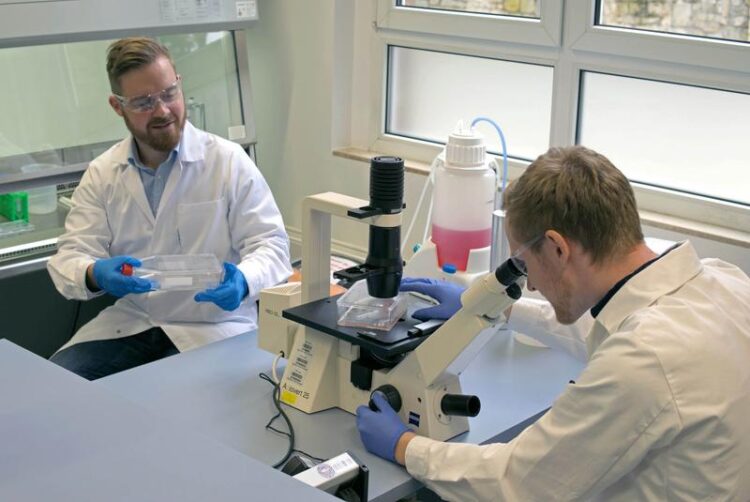Hemp helps to heal

Dr Paul Mike Jordan (left) investigates the actions of cannabinoids in humans with Lukas K. Peltner (right).
Photo: Anna König
International research team clarifies mode of action of cannabinoids in inflammation.
While the German government is planning to relax legislation on the use of cannabis, researchers from the Friedrich Schiller University Jena, together with colleagues from Italy, Austria and the USA, have identified the mode of action underlying anti-inflammatory effects demonstrated by cannabinoids. A few days ago, the federal government took the controversial decision to make the acquisition and possession of small amounts of cannabis exempt from punishment. Provided the German parliament approves the draft bill, the “Cannabis Act” will come into force next year. While some consider this move to be long overdue, others continue to warn strongly against the health risks of cannabis use.
The Jena researchers and their colleagues are now taking a different look at cannabis – at the traditional medicinal plant – with a study published in the journal “Cell Chemical Biology”. The team from the Institute of Pharmacy investigated how certain ingredients from the cannabis plant counteract inflammation. It was already known from previous studies that cannabis is not only an analgesic and an antispasmodic, but also has an anti-inflammatory effect. “However, the reason for the anti-inflammatory effect was largely unclear until now,” says Dr Paul Mike Jordan, who led the study together with Prof. Oliver Werz.
The researchers studied how different cannabinoids, including the psychoactive THC (tetrahydrocannabinol) and CBD (cannabidiol), which is already found in freely available products today, act on human immune cells. “We found that all eight cannabinoids we studied had anti-inflammatory effects,” says Lukas Peltner, doctoral student and first author of the study. “All the compounds we studied were found to inhibit the formation of pro-inflammatory messenger substances in cells while enhancing the formation of inflammation-resolving substances.”
CBD induces a switch in immune cells
CBD in particular proved to be highly effective and the team investigated it in more detail with regard to its mode of action. The researchers were able to determine that CBD activates the 15-lipoxygenase-1 enzyme, which triggers the production of inflammation-resolving messenger substances that subsequently cause the inflammation to subside. “CBD thus induces a switch in the affected cells, so to speak, which steers the inflammatory process from the promoting to the inhibiting side,” explains Dr Jordan. The researchers were also able to confirm these results, which were obtained in cell cultures, in animal experiments on mice.
In the long term, the insights gained could lead to new therapeutic strategies for treating inflammatory diseases, the researchers conclude. The focus should be on CBD, which was the most effective cannabinoid in the study. Previously approved preparations with cannabinoids contain CBD, “but also the psychoactive THC, which can be associated with a variety of side effects”, notes Dr Jordan. Therapeutics containing only CBD would reduce this problem.
The research work has been carried out within the Collaborative Research Centres “PolyTarget” and “ChemBioSys” of the University of Jena, Germany and has been funded by the German Research Foundation.
Wissenschaftliche Ansprechpartner:
Dr Paul Mike Jordan, Prof. Oliver Werz
Institute of Pharmacy of the Friedrich Schiller University Jena
Philosophenweg 14, 07743 Jena, Germany
Tel.: +49 (0)3641 949827, E-mail: paul.jordan@uni-jena.de
Originalpublikation:
Peltner LK et al. Cannabidiol acts as molecular switch in innate immune cells to promote the biosynthesis of inflammation-resolving lipid mediators, Cell Chemical Biology (2023). https://doi.org/10.1016/j.chembiol.2023.08.001
Media Contact
All latest news from the category: Life Sciences and Chemistry
Articles and reports from the Life Sciences and chemistry area deal with applied and basic research into modern biology, chemistry and human medicine.
Valuable information can be found on a range of life sciences fields including bacteriology, biochemistry, bionics, bioinformatics, biophysics, biotechnology, genetics, geobotany, human biology, marine biology, microbiology, molecular biology, cellular biology, zoology, bioinorganic chemistry, microchemistry and environmental chemistry.
Newest articles

Innovative 3D printed scaffolds offer new hope for bone healing
Researchers at the Institute for Bioengineering of Catalonia have developed novel 3D printed PLA-CaP scaffolds that promote blood vessel formation, ensuring better healing and regeneration of bone tissue. Bone is…

The surprising role of gut infection in Alzheimer’s disease
ASU- and Banner Alzheimer’s Institute-led study implicates link between a common virus and the disease, which travels from the gut to the brain and may be a target for antiviral…

Molecular gardening: New enzymes discovered for protein modification pruning
How deubiquitinases USP53 and USP54 cleave long polyubiquitin chains and how the former is linked to liver disease in children. Deubiquitinases (DUBs) are enzymes used by cells to trim protein…



